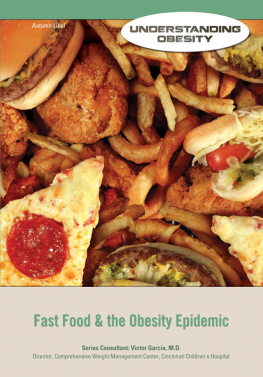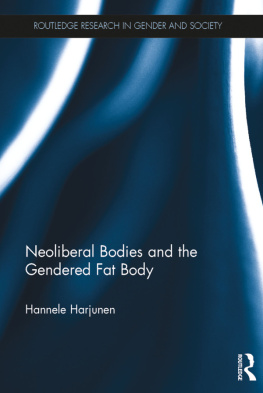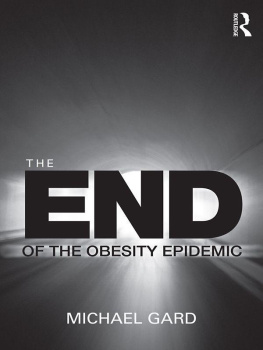Library of Congress Cataloging-in-Publication Data
Names: Zimdars, Melissa, 1985 author.
Title: Watching our weights : the contradictions of televising fatness in the obesity epidemic / Melissa Zimdars.
Description: New Brunswick, NJ : Rutgers University Press, [2018] | Includes bibliographical references and index.
Identifiers: LCCN 2018004266 | ISBN 9780813593555 (cloth : alk. paper) | ISBN 9780813593548 (pbk. : alk. paper)
Subjects: LCSH: Obesity on television. | TelevisionSocial aspectsUnited States. | ObesitySocial aspects.
Classification: LCC PN1992.8.O24 Z56 2018 | DDC 791.45/6561dc23
LC record available at https://lccn.loc.gov/2018004266
A British Cataloging-in-Publication record for this book is available from the British Library.
Copyright 2019 by Melissa Zimdars
All rights reserved
No part of this book may be reproduced or utilized in any form or by any means, electronic or mechanical, or by any information storage and retrieval system, without written permission from the publisher. Please contact Rutgers University Press, 106 Somerset Street, New Brunswick, NJ 08901. The only exception to this prohibition is fair use as defined by U.S. copyright law.

The paper used in this publication meets the requirements of the American National Standard for Information SciencesPermanence of Paper for Printed Library Materials, ANSI Z39.481992.
www.rutgersuniversitypress.org
Manufactured in the United States of America
For my parents, Tom and Karla.
On behalf of our chubby trio, I welcome you into our flabby foursome, Ethel says to Lucy, who dramatically responds, Im going to go out and kill myself. Lucy, who had gained weight since marrying Ricky, realizes her weight increase only when Ricky, Ethel, and Fred make her step on a scale after she calls Ricky porky and fatso for eating sixteen oysters. While Ricky, Ethel, and Fred all admit with minimal lament to getting a little puffy over the years, Lucy takes the news hard, referring to herself as just a bunch of blubber. The remainder of The Diet (1951) episode of I Love Lucy (19511957) depicts Lucy running circles around her apartment to lose twelve pounds in four days in order to fit into a dance costume for Rickys show. In classic I Love Lucy form, she also goes on a strict diet of celery that starves her to the point of stealing table scraps from the hopeful dog waiting under the dinner table. Desperate to meet her weight-loss goal, Lucy even sits in a human pressure cooker to sweat out the pounds. By episodes end, she achieves her weight-loss goal, but is so delirious and malnourished that a medical doctor orders her to spend three weeks recovering in bed.
On its surface, this episode perpetuates fat and body shaming in relation to characters whom audiences may not even read as fat. In fact, Lucys goal in the episode is to fit into a size twelve costume, which would be considered a size six or eight by todays fashion standards. The Diet also reinforces the notion that fatness is undesirable, that becoming fat is something to be avoided at all costs, even if dieting makes you miserable. Yet, at the same time, the show positions Lucys weight-reduction techniques as excessive, silly, and even unnecessary. Ricky refers to her as plump in a loving rather than denigrating way. And Lucy was not bothered by her body size before stepping on the scale and attaching a number to it, before deciding to fit her body into a costume instead of fitting a costume to her body. Until Lucy allowed external bodily cues from people and clothing to start dictating her worth, she seemed perfectly fine with herself.
This same narrative plays out again and again on television. One episode of The Odd Couple (19701975), Fat Farm (1971), shows Bob convincing Oscar to accompany him to a fat farm after watching him eat six hotdogs at a baseball game, but only chewing two. After his doctor also recommends losing weight to improve his health, Oscar begrudgingly agrees, but jokes, It embarrasses me to be around all of those fat people because Im one of them. Nobody wants to see fat birds of a feather flocking together. The nutrition and exercise practices at the fat farm prove to be as outrageous as Lucys attempts to lose weighttheyre only allowed to nibble on celery and carrots, theyre only allowed to eat imaginary baked Alaska for dessert because weight is all in the mind. These restrictive practices push Oscar to smuggle in salami, bread, and cheese, leading to warnings that hes going to be expelled from the fat farm and left to deal with his bad body on his own. Similarly, Bob on The Bob Newhart Show (19721978) also desires to lose weight to improve his health per his doctors advice. Bobs doctor gives him charts to track calories, pamphlets detailing exercises, and a complicated list of foods to avoid, leaving Bob to ask, Wouldnt it be easier to just stop eating? Like Lucy and Oscar, Bob goes on a strict diet, but eventually becomes so hungry he wants to attack everything edible. But by the end of Fit, Fat, and Forty One (1973), Bob does lose ten pounds and his wife, Carol, finds him much sexier this way.
Again, none of these actors would likely be read as fat, especially today, yet these episodes rather straightforwardly reject fatness and fat individuals flocking together. Airing almost twenty years after I Love Lucy , both The Odd Couple and The Bob Newhart Show add another layer to discussions of weight and dieting, reflecting the social context of the time. When I Love Lucy aired The Diet, fatness was not yet considered a major medical concern; however, from the 1950s to the 1970s concerns over fatness moved from the margins to the mainstream. Whereas I Love Lucy focused on the aesthetic of the body and on reducing ones body size to fit clothing, The Odd Couple and The Bob Newhart Show overtly link fatness and health status. This is not to say that the appearance of the body became of less concern; rather health concerns increased in prominence as well as legitimacy. Oscars physician says to him while holding a ceramic heart in his hand, Fat is the mortal enemy of this amazing machine! And Bobs doctor tells him, Every extra pound of fat takes a year off of life. This TV trope can be found in other series of the time too, such as the Archies Weighty Problem (1976) episode of All in the Family (19711979) and the Crash Diet (1978) episode of CHiPs (19771983), where fatness is referred to as an insidious killer.
These episodes center narratives of health, weight, and fatness, and they also contain moments that offer important commentary on dieting and the pressures many of us feel to make our bodies smaller. For example, on The Bob Newhart Show , when Bobs secretary, Carol, does not respond supportively to his complaints about his water-only lunch, he charges, Youve probably never been on a diet! Exasperated, Carol responds, In five minutes Ill have been on a diet for seven years . This quip demonstrates the way bodily expectations and experiences are also deeply gendered, with women typically feeling more pressure to be thin. Nonetheless, feminist accounts of fat embodiment or critical interrogations of discourses emphasizing weight loss via water-only diets took a lot longer to make it on the small screen in overt ways.



 The paper used in this publication meets the requirements of the American National Standard for Information SciencesPermanence of Paper for Printed Library Materials, ANSI Z39.481992.
The paper used in this publication meets the requirements of the American National Standard for Information SciencesPermanence of Paper for Printed Library Materials, ANSI Z39.481992.






